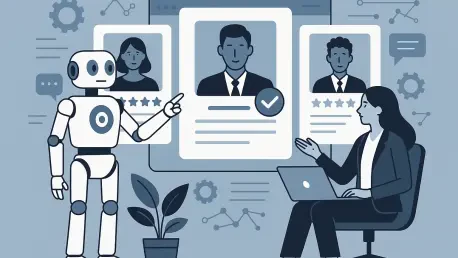As technological advancements continue to permeate various sectors, the field of human resources is not immune. Artificial Intelligence (AI) is increasingly utilized in recruitment processes to manage large volumes of job applications effectively. However, while AI offers efficiency, its role in truly enhancing diversity remains contentious. A study conducted by the University of South Australia, with findings published in The International Journal of Human Resource Management and The Palgrave Handbook of Breakthrough Technologies in Contemporary Organizations, explores this dichotomy. The study investigates AI’s capabilities in streamlining HR processes and assesses whether it effectively meets diversity and inclusion goals.
AI’s Efficiency in Recruitment
Balancing Efficiency with Diversity Goals
In the current landscape, AI tools have become indispensable in managing the deluge of applications companies receive for openings. The technology efficiently screens job applicants, automates responses, and matches candidates with job requirements. However, the study emphasizes a critical finding: AI’s efficiency-driven applications are not a standalone solution for achieving diversity outcomes. While AI processes data swiftly, reliance solely on these systems does not necessarily curb bias or substantially enhance workplace diversity. To leverage technology in meeting diversity targets, organizations must cultivate a deliberate commitment to diversity goals.
An important insight from the research is that while AI can facilitate many HR responsibilities, including resume sifting and automatic communication, significant challenges remain regarding its qualitative impacts on diversity. The study argues for AI systems that offer transparent decision-making processes, encouraging organizations to incorporate diversity and inclusion understanding. Without building systems capable of explaining how diversity-related decisions are made, AI runs the risk of mechanically reinforcing existing biases rather than enhancing diversity. This transparency issue highlights the necessity for qualitative insights in AI’s decision-making processes.
Organizational Responsibility for Diversity Outcomes
The research underscores the necessity of a dedicated organizational commitment to diversity, equity, and inclusion for AI to successfully support diverse hiring outcomes. Clear diversity guidelines serve as a foundation, motivating HR professionals to incorporate AI thoughtfully and reflectively into decision-making processes. Despite AI’s ubiquity in sectors ranging from healthcare to finance, there is a noticeable hesitance in fully integrating AI within HR. Concerns primarily revolve around AI’s dependency on potentially biased data sets, which could perpetuate current inequalities instead of alleviating them. Therefore, a conscientious approach where organizations actively prioritize diversity aligns AI’s efficiency with the moral and ethical groundwork necessary for inclusive recruitment processes.
AI’s Limitations and Human Skepticism
The Limitations Rooted in Bias
A significant roadblock to AI’s acceptance in HR recruitment is its omnipresent limitation: data bias. AI systems derive their intelligence from existing data sets, which, if biased, elicit biased outputs. This reliance poses a risk of reinforcing societal preconceptions unconsciously embedded within data trends. Consequently, many HR leaders voice concerns about the perceived dehumanization and impersonal nature AI might inject into the recruitment experience. In cases where there is confidence in existing human-run HR processes, transitioning to AI is seen as unnecessary. The concern is that these systems might fail to address the nuanced requirements of diverse recruitment, instead exacerbating underlying differences through automation.
While AI proposes a convenient solution for muddling through voluminous applications, it is crucial to recognize when it could become an operational liability rather than an asset. The research conducted by Associate Professor Connie Zheng with HUMAINE in Germany probes whether integrating diverse needs directly ameliorates diversity impacts. Unfortunately, incorporating diverse data alone doesn’t guarantee increased fairness; human oversight and diligence are paramount for AI to function truly inclusively.
Balancing Cost-Savings and Inclusivity
In environments where staffing is reduced or resources are stretched thin, AI’s ability to streamline processes presents an advantageous proposition. However, prioritizing efficiency should not come at the expense of crucial diversity and inclusion benchmarks. Cost savings and reduced workloads are significant drivers for adopting AI, but not at the risk of eliminating the human elements necessary for comprehensive diversity introspection. The realization that efficiency does not inherently translate to diversity needs a shift toward holistic AI application, balancing technological advancements with equally important human ethics and frameworks.
The Future of AI and Diversity in HR
Proactive Engagement for Inclusive Outcomes
The research indicates that AI’s impact on fostering diversity is contingent upon an organization’s inherent environment and commitment to diversity goals. AI in HR can indeed facilitate progress, but ultimately requires infrastructure where technological application is aligned with ethical, diversity-focused organizational objectives. AI should serve as a catalyst, supporting informed, reflective decision-making processes among HR professionals. This entails cultivating environments that harmonize efficiency-driven innovations with inherent diversity needs, where AI acts less as a replacement mechanism and more as a collaborative augmentation to human resource efforts.
Building Ethical and Technical Synergy
As technological advancements become increasingly embedded across various sectors, the realm of human resources is no exception. Artificial Intelligence (AI) is being leveraged more and more in recruitment processes, primarily to handle large volumes of job applications efficiently. AI is lauded for its potential to bring unprecedented efficiency, yet its ability to genuinely enhance diversity remains a subject of debate. A study by the University of South Australia sheds light on this issue, with findings published in both The International Journal of Human Resource Management and The Palgrave Handbook of Breakthrough Technologies in Contemporary Organizations. The research delves into AI’s capacity to optimize HR processes while scrutinizing its effectiveness in adhering to diversity and inclusion objectives. Ultimately, the study provokes thought on whether AI’s algorithms succeed in promoting a diversified workforce or if they inadvertently uphold existing biases, highlighting a crucial area in ongoing HR technology discourse.









